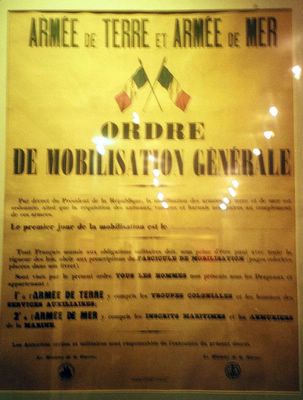
The summer of nineteen-fourteen
has been made idyllic
through the prism of memory:
nostalgic images of a lazy purling stream
meandering through the peaceful village
under a buzz of bees and hummingbird wings;
of high teas with strawberry and cream,
of respectful peasants at their tillage,
of order and stability in all things.
Poof! It was nothing of the sort.
One can objectively report
and the diarists of the time will readily confess
that the world was already in a mess,
quite ready and willing to go to war,
and had been for some time before.
The apogee of pride and prosperity
reached its peak around eighteen eighty six
at home, and in farflung British dominions;
the Empire commenced its slide downhill
with the Second Irish Home Rule Bill;
and Victorian gentlemen, with asperity,
were wont, ever afterwards, to fix
that date in their opinions.
By mathematical extraction
(learned at school as subtraction)
there are twenty-eight years left adrift
between 1886 and 1914;
and, as can be wryly foreseen,
this will allow the blame to shift
for decline and contamination
on that hapless generation.
Conscience made brief appearances
and (inevitable) disappearances
as the ancient ruling classes
gave ground to the growling masses.
Under brave Parnell, until he fell,
(hounded to his death by his own countrymen, I might add,
Irish jackals will only attack a wounded lion, bedad!!)
the Irish had set out to leave the UK,
and it's eminently fair to say
this was not the first nor last temptation
to do so by that wounded nation.
(Let's leave it at that: today,
Ireland is five-sixths OK.
Up the Republic!!)
But in Britain at the time, what was going on?
Even now, today, it's not easy to say:
Blind conviction gave way to "I surmise" or "I feel",
and the bedrock the Empire had been borne upon
was slowly, steadily, being whittled away:
an empire taken for granted, yet not quite real.
Extending the benefits of English civilization
became a minor not major consideration;
the extraction of profit was no longer the aim,
so what, indeed, was the point of the game?
Power and pride, perhaps,
and in the event of a lapse
overseas employment for wayward sons
and a chance to try out new guns.
Whatever happens we have got
The Maxim Gun, and they have not.
After the Crimean ( 1856-58 ) disaster,
slowly, and then faster and faster,
the despised but tough little British Army
trained on rebellious natives.
They were ever victorious
happy and glorious
in India (1857) and China (1860),
in Ethiopia (1868) and Zululand (1879)
and ever and always
on the wild and woolly Afghan frontier.
When the Boers said, "What's mine is mine!"
Britain thought there'd be nothing to it,
(that would be South Africa -- 1899)
but, then, after three years, lived to rue it.
The Boers -- Dutch white settlers -- arose
and the world stood up and said ... Yesss!!!
when Britain suffered a series of blows.
At last, at last, there will be redress
for all those years of arrogance!
The Army went on to win in the end,
after initial and surprising defeat,
dealt out by "European" opponents
for a change; one should consider the range
and consider the various components
of this war -- the barbed wire, the machine guns,
the concrete blockhouses, the concentration camps,
all the features that would so soon repeat
with ruthless exponential brutality,
the new twentieth-century reality.
Only this time in Europe.
Britain "won" the First World War
at least until Hitler came along;
then they had to fight the Second Half
of the extended German War as well
for which I confess, one can do no less
than admire them. They stood up
when the rest of the world stood down.
Including America.
So that was the final end,
in victory, of the farflung British Empire.
The eccentric awkward island remains
querulously independent to this day.
Rapidly, with very little delay
most of the red and the pink bits on the map
have faded and gone away.
Yet who can say
that this is a bad thing?
Is there a lesson for our American cousins?
Damn right, there is. I'm coming to it,
in fact, what do you think I'm writing for?
Look upon this poem as a metaphor.
Since I don't wish to seem to attack
you (you can be so-o-o sensitive!!).Iraq
and the Idiot and his Cronies, on this occasion,
will be airbrushed out of the equation.
There has been enough political talking.
I think, on the whole, you should be walking
Home. Leave it. You sure as hell don't need it.
The British found out the hard way
that tyranny, which is what Empire is,
does not befit a free people.
It hurts the people at home
just as much as the "natives" overseas:
even more, in some ways.
America has its own history of defiance,
real enough at the time, now Disneyfied,
and unfortunately ill-remembered:
Geo Washington and the cherry tree!
But a Republic is not an Empire,
not if its citizens remain vigilant.
Avoid it like poison. Keep the soldiers home.
Do not become another Rome.
----------------------------
For an article on the 1914-18 War, based on a visit to the Somme and Ypres, please go to the link Armistice Day on this blog.